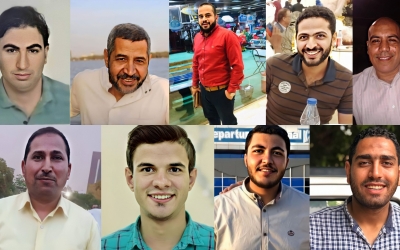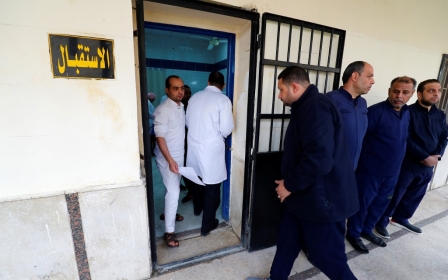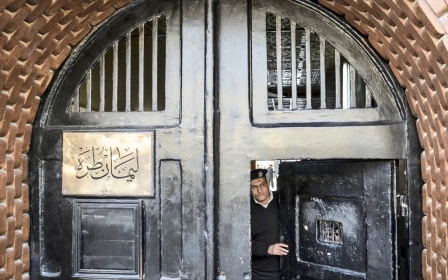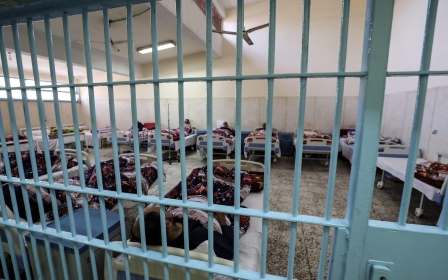Egypt arrests chairman of news outlet over currency devaluation story

Egyptian security forces arrested the chairman of one of the country's newspapers on Sunday, underscoring the repressive crackdown on press freedoms under President Abdel Fattah el-Sisi.
Mostafa Sakr was arrested after an article suggested Egypt's Central Bank was manipulating the price of the Egyptian pound against the US dollar, sources told Middle East Eye.
He was taken to a police station in the Cairo suburbs of Nasr City, where he was interrogated by the State Security Prosecution. The sources also said he was ordered to be detained for 15 days, pending investigations.
A legal source at the prosecution confirmed the arrest and told MEE that he was charged with "joining an illegal group", a vague accusation directed against Islamists and secular detractors.
However, the source could not confirm if the arrest was due to the publishing of the article.
New MEE newsletter: Jerusalem Dispatch
Sign up to get the latest insights and analysis on Israel-Palestine, alongside Turkey Unpacked and other MEE newsletters
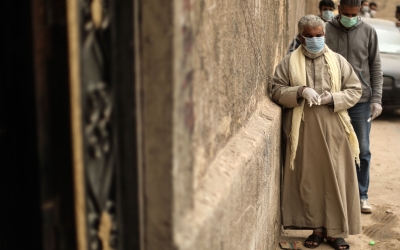
Sakr is the chairman of Business News for Press, Publishing and Distribution Company, which runs Daily News Egypt and its Arabic financial sister publication Al-Borsa.
Both websites have been blocked by the government, and the company uses mirror websites and social media to market their content. The two publications also produce two different daily newspapers by the same names.
Sources in the company's management speculated the arrest came after the article criticised the Central Bank's monetary policy and said it was destined to fail.
It added that if policymakers tried to support the pound for an extended period, they risked repeating the same problems that arose in 2016 that led to a 50 percent fall in the currency against the dollar.
The report also said that the Central Bank of Egypt was planning to allow the pound to fall by 7.5 percent of its current value.
According to the management, the article angered officials from the banking sector and led to disagreements between the publishers and the authorities.
The story, which quoted a report from the London-based economic research consultancy Capital Economics, has since been pulled from the Arabic speaking website.
Asset freeze
Daily News Egypt has long been an independent voice, free from government interference and covered human rights-related cases, state-sponsored violence, and social issues.
However, under state-controlled management, the editorial policy of the newspaper has shifted to highlight tourism, entrepreneurship, business, banking, and sports.
In 2017, Sakr's company was taken over by a state-run newspaper as part of moves targeting the assets of the Muslim Brotherhood.
A committee was subsequently assigned to take over Brotherhood assets with the two newspapers coming under the control of the state-run Akhbar El-Yom.
This came after Sakr found his name on a list of individuals whose accounts were to be frozen. He was also placed on a "terrorist list", which included late president Mohamed Morsi and popular footballer Mohamed Abu Treka.
After Sakr's assets were subject to the asset freeze due, the newspaper's parent company - Business News - issued a statement denying any affiliation with any political or religious group and vowed to challenge the decision in court.
"The company has been working in the press and media field since 2008, and neither it nor any of its employees or founders belong to any partisan, political or religious groups," it said.
Still, in May 2017, police raided the offices of the newspapers and briefly detained Sakr, confiscating a dozen computers under the pretext of an investigation into whether pirated computer software was being used.
A journalist from the newspaper told MEE on Monday that despite Sakr's arrest, the newspaper would continue operating.
The journalist added that Sakr had not been involved in the newspaper, managerially and editorially, since the state-run committee had taken over the newspapers in September 2017.
Middle East Eye delivers independent and unrivalled coverage and analysis of the Middle East, North Africa and beyond. To learn more about republishing this content and the associated fees, please fill out this form. More about MEE can be found here.


